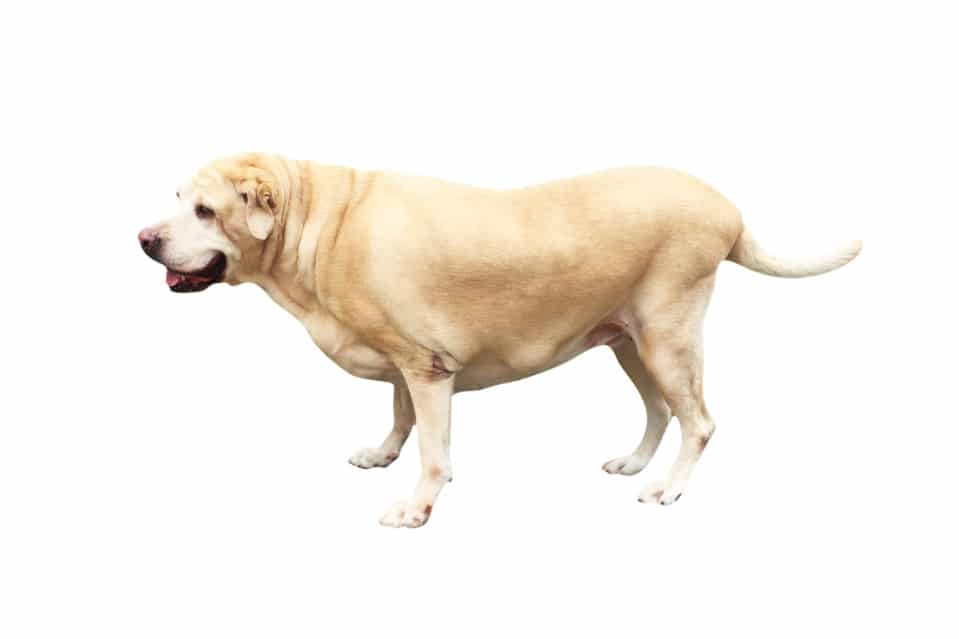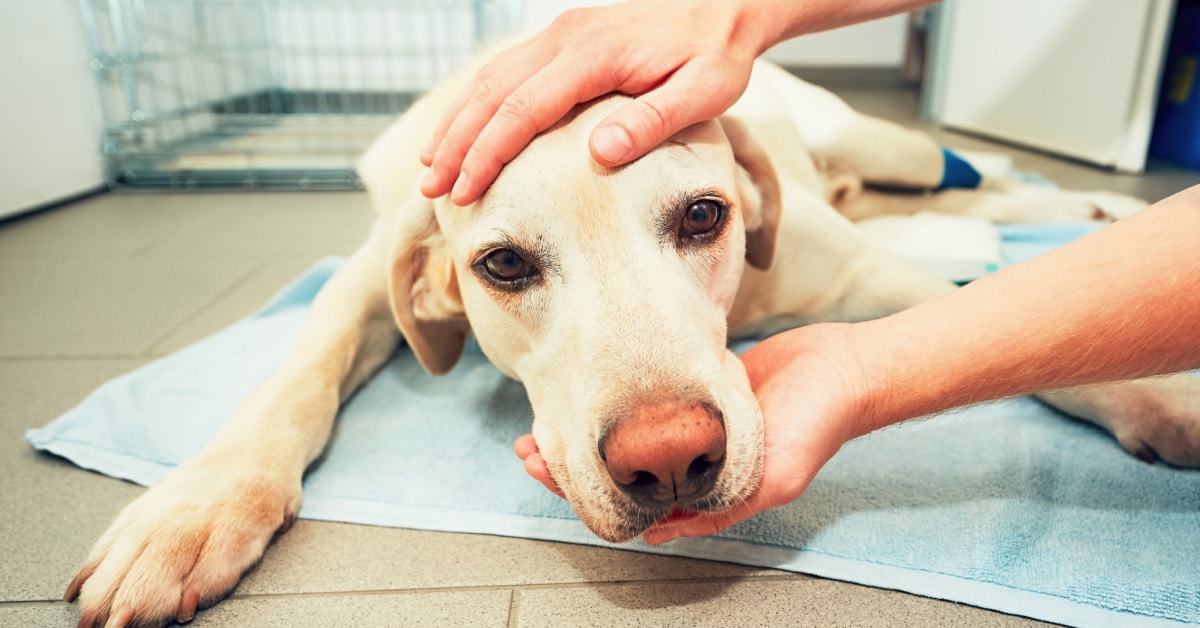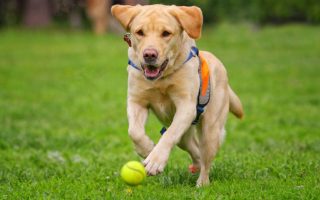Labrador Retrievers may be generally healthy, but that doesn’t stop them from falling victim to a number of common Labrador health problems.
In fact, the top three common conditions of Labradors are obesity, Otitis Externa, Degenerative Joint Disease.
This article will go through these common Labrador health problems and talk about what you can do about them.
But, before all of that, keep in mind. That the information we have here is not meant to replace a certified veterinarian’s advice.
While this article was heavily researched and will give you plenty of insight. The best choice would be to consult your vet if your Lab is showing signs of health problems.
Now that we’ve gotten that disclaimer out of the way. Let’s dive into the common Labrador health problems that you may have to be wary about.
1) Obesity
We’re not new to the idea that Labrador Retrievers have a propensity for eating. In fact, it is public knowledge that obesity is one of the top health problems among many Labradors.
There’s even a recurring statement that Labradors have bottomless stomachs.
To a certain extent, this may be true. There have been various research papers that detail the specific gene mutation. That Labs have that causes them to have problems with feeling full.
Around 25% of Labrador Retrievers have this specific gene mutation, which prevents them from physically feeling full even though they’ve already eaten enough.
What you can do about it:

Fortunately, obesity is a health condition that you can prevent by properly caring for your Labrador.
With proper diet and sufficient exercise, you will significantly lessen your Lab’s chances of becoming overweight.
For example, you can switch to healthier treats, such as apples. Instead of the regular treats that you give your Labrador Retriever.
This way, they can still get the fun of a treat but at a lesser calorie cost.
Watching how much food they eat is one of the best ways that you can prevent obesity in your Labrador.
Make sure that you feed your Lab only what they need. If they are already starting to gain weight, you can cut back on the treats first.
Apart from that, make sure that your Labrador gets all the exercise that they need.
A good basis is around 2 walks a day, or maybe even half an hour of physical activity. The amount of exercise they need will depend on the individual needs of your Labrador Retriever.
2) Otitis Externa (Ear Inflammation)
Labradors have these characteristically floppy ears that make them look very endearing.
And while that is great in terms of making them look cute. It can lead to future health issues, such as ear infections.
Plus, many people also consider Labs to be good swimmers. Most Labradors learn to love water pretty quickly, and they enjoy playing and splashing in bodies of water.
This is a fun thing since you’ll have little trouble with baths. It’s also an additional source of exercise.
However, do take note that water exposure also increases the risk of getting otitis externa.
This ear disorder is an inflammation of the external ear canal. Causes a lot of discomfort and pain in many cases.
Since Labradors are avid swimmers, their water exposure increases their likelihood of contracting otitis externa.
Common symptoms of this kind of ear inflammation are pain and discomfort (in one ear or both) and discharge coming out of the ear.
Otitis Externa often results from bacterial infections.
What you can do about it:
First, if you notice that your Labrador is exhibiting symptoms of otitis externa, you should consult your Lab’s vet.
Your vet should be able to diagnose your Labrador Retriever and prescribe an appropriate treatment plan.
Otitis externa can be acute or chronic. But it usually goes away in a couple of days with the proper treatment.
The best advice, however, is always prevention. Make sure to regularly clear your dog’s ears (but not too often. As it can also increase the chances of getting an inflamed ear).
Aside from that, avoid using ear products that push more debris into the ear canal of your Lab.
There is a proper way of cleaning a Labrador’s ear, so make sure that you follow those suggestions.
Regular inspection of your Lab’s ear is also a good way to see if there is anything amiss or if it is time for a cleanup.
3) Degenerative Joint Disease
Other terms for Degenerative Joint Disease include arthritis and osteoarthritis. This occurs as a result of the joints degenerating over time and through relevant factors.
This is one of the most common Labrador health problems since it makes mobility much tougher. Causes chronic pain for your Lab.
The fact that many Labradors are overweight also contributes to this common Labrador health problem.
Weight loss exacerbates the strain caused by movement on the joints. At a certain point, it will be difficult for the joints to support the extra weight.
Degenerative joint disease usually happens in middle-aged or older Labradors.
This problem may also be part of the reason why older Labs are less active. Although it is important to note that their energy levels naturally decrease when they get to a certain age.
Additionally, the activity levels of Labradors could also have contributed to the strain on their joints.
This is not to say that you should not exercise your Lab. Moderation is the key, especially when your Labrador already has joint pains and has trouble with mobility.
What you can do about it:
Treatments for degenerative joint disease can be surgical or not. Consult your vet for possible courses of action that you should take for your Labrador Retriever.
One of the most common nonsurgical courses is to use anti-inflammatory medication to reduce the swelling and alleviate the symptoms.
Weight loss (up to a healthy weight) is also recommended in many scenarios since the lesser the weight strain on the joints, the better it is for the pain.
An additional layer of protection is also not to overexercise your Lab as a puppy.
Too much exercise when they are still puppies reportedly. Increases their risks of joint problems due to the improper development of their joints.
4) Periodontal Disease
Periodontal disease is a problem with your Lab’s gums. It occurs when the gums are inflamed through bacterial means and the build-up of plaque.
Periodontal disease occurs in stages, and if you catch the plaque early. The gingivitis can still be removed, and you can avoid going into the later stages of periodontal disease.
What you can do about it:
The prevention of periodontal disease is simple. Just regularly brush and properly take care of your Lab’s teeth to help prevent periodontal disease.
In many cases, plaque is easy to remove. You can maintain healthy teeth with a little time in a day. And you don’t really have to do a lot for basic and regular upkeep.
Your Lab’s diet also influences the cleansing mechanisms of your teeth. So be sure to specifically choose a diet that is tailored to your Labrador’s teeth care.
Some types of food have specific ingredients that help reduce bacteria build-up.
Takeaway
There is no surefire way to ensure that your Labrador Retriever does not ever develop any of the common Labrador health problems. However, there are a number of measures you can take to prevent them.
Be sure to contact your vet right away. If you believe your Lab is showing some signs and symptoms of any common Labrador health condition.







